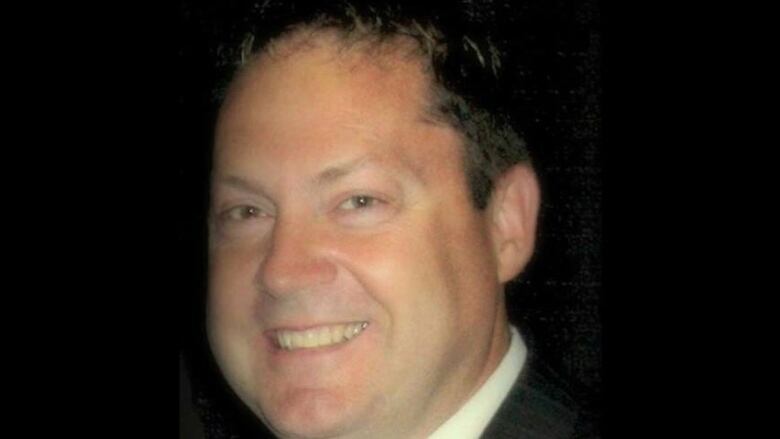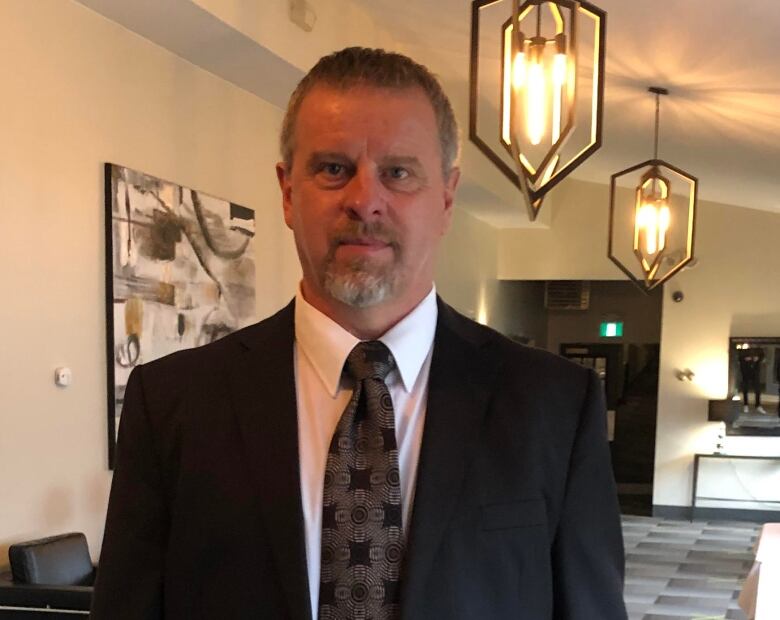Paramedic says Michel Vienneau had no vital signs when ambulance arrived on scene
Tracadie man was shot to death by police outside a Bathurst train station in January, 2015

A paramedic with Ambulance New Brunswick says Michel Vienneauhad no vital signs when she arrived at the scene of his shooting in January 2015.
The 51-year-old businessman from Tracadie was shot and killed by police outside the Bathurst train station.
A coroner's inquest began this week in Beresford. It is being held in a large meeting room at Danny's Inn to allow spacefor physical distancing.
There's room for 46 people inside.Vienneau's brother and parents were among the few people in the gallery Tuesday afternoon.
A jury of two women and three men was selected Tuesday morning from those who'd shown up for duty.
The first witness to testify was Ambulance NB paramedic Kayla Knowles. She said she was dispatched to the Bathurst train station at about 11:30 on Jan. 12, 2015, for a report of a traumatic injury from a stabbing or gunshot.
Knowles said when she arrived, two other people were already doing CPR on Vienneau. They werePatrick Bulger and Denis Lajoie, both of whom she knew to have past medical experience.

Knowles took over but said Vienneau had no vital signs and did not respond to efforts to revive him.
An emergency room doctor, Michel Blanchard, testified that staff at the Chaleur Regional Hospital were also unable to revive Vienneau.
He was declared dead at 11:55 a.m.
The pathologist who did the autopsy, Dr. Ather Naseemuddin, said Vienneau had no significant toxic substances in his system, but he did have three serious gunshot injuries.
One bullet went through his arm, his left lung and his heart and ended up in his right lung, said Naseemuddin, causing "massive internal bleeding," which would be "rapidly fatal."
The final witness of the day was Ron Desilva of the RCMP. He's now with the southeast division in Moncton, but at the time he was in charge of an intelligence unit targeting organized crimein the northeast of the province. He said the unit included RCMP and Bathurst city police officers.
Desilva testified that about 90 minutes before the fatal shots were fired, he had received an email about an anonymous Crimestoppers tip.
The tip was that two individuals from the Acadian Peninsula were on the train from Montreal to Bathurstand trafficking drugs.
A second tip received shortly after provided more details about the ages of the two people and said that the drugs were pills.
Desilva said he thought the information had been submitted in English.
P.J. Veniot, one oftwo lawyers hired by the coroner's office to question witnesses at the inquest, asked Desilva about the type of identification and equipment officers would normally take to that type of call.
Desilva said it was normal for them to have firearms and wear their badges around their neck on chains, though they weren't in uniform.
He also said it's very rare for intelligence officers to take part in a "high-risk takedown."
Desilva also said he had not authorized anyone to make an arrest at the train station that day.
Chief coroner Jerome Ouellette said 25 or 26 witnesses are expected to testify by next Monday.
Originally two weeks were set aside, but two witnesses have died, a doctor who assisted at the scene has left the country and can't be found, and some other witnesses have yet to be located.

A coroner's inquest does not include cross-examination, although jurors can ask questions when the inquest lawyers are done with each witness.
As well, lawyers for Vienneau's family, his fiance Annick Basque, as well as the City of Bathurst and other interested parties can submit questions they have in writing to the inquest lawyers, who then decide whether they are valid and should be directed to a witness.
Ouellette said they ensurequestions aren't accusatory, because the purpose of an inquest is not to layblame.
The two police officers at the centre of the incident, Mathieu Boudreau, and Patrick Bulger, are expected to testify Wednesday.
"We'll paint a picture of what happened," said Ouellette.
At the end of the inquest, jurors will be asked to make any recommendations necessary to prevent a similar tragedy in the future.












_(720p).jpg)


 OFFICIAL HD MUSIC VIDEO.jpg)
.jpg)



























































































